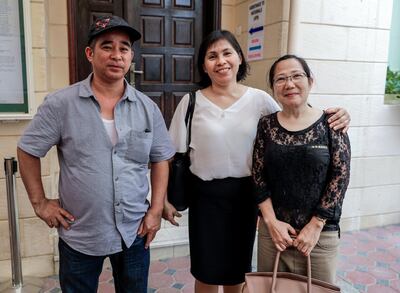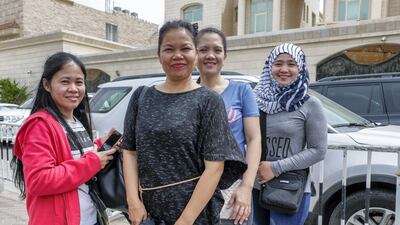Filipinos in the UAE have called for the country's war on drugs to continue - as polls opened in Abu Dhabi for the Phillipines' midterm elections on Saturday.
Voters turned out at the Philippines Embassy in Abu Dhabi to cast their ballots in the upcoming election, which is being viewed as a referendum on the controversial policies of President Rodrigo Duterte.
A total of 12 seats will be up for grabs in the country's senate, while the Philippines electorate will also appoint 300 members of congress, local council members, provincial governors as well as town and city mayors.
The Philippines is one of several countries to have an absentee voting system, which allows nationals aged 18 and above to take part from overseas, as long as they are registered in advance.
Voting will continue until Saturday, May 13
While Duterte is not facing the voters himself, a number of Filipinos at the polls in the UAE capital said they were supporting candidates with similar policies.
Elected convincingly in 2016, Duterte has pursued a bloody and violent war on drugs, backed a return to capital punishment and has launched an anti-corruption drive.
However, a favourable Senate and House of Representatives, which both have the power to block laws, is seen as vital if he is to deliver on his priorities, including a programme of constitutional reform and a huge injection of infrastructure spending.
“ I want the anti-drug campaign by President Rodrigo Duterte to continue,” said Orson Ceniza, after voting for the OFW party.
“I have noticed that drug use has dropped in our area,” said the 46-year-old nurse, originally from the island of Mindanao.
“I want to exercise my voice; especially since I have my favourite candidates and senators.”
He added that he would like to see more corrupt officials brought to justice.
Marissa Filosopo, a 43-year-old school-bus attendant, also voted for the OFW party.
“I want to see progress in my country; no drugs, no rape.”
She said since President Duterte came into power in June 2016, there has been a reduction in drug crimes.
“There was a lot before. And no to corruption, that is the main thing.”
She said she would also like to see the new candidates focus on education.
“Some government schools don’t have enough classrooms for the pupils. My daughter is in eighth grade and sometimes they call off the lessons if they don’t find an available classroom,” she said.
“And I would like to see more tourists come to the Philippines.”
Inside the voting hall, matters seemed to run smoothly on the first day of elections.
While voters entered continuously, there wasn’t heavy traffic that required waiting in line.

The embassy will receive voters between 9am and 5pm until election day itself on May 13, when voting will end at 2 pm.
Lida Detros said living conditions have improved in the Philippines since President Duterte came to power.
“There are a lot of Filipinos with better living conditions now, and there are more job opportunities and the economy is getting better.”
During the midterm elections in the Philippines. Also, senators will be contesting over 12 of the 24 seats in the country’s upper house of Congress.
There are 109,130 voters eligible to take part in Abu Dhabi, according to the Filipino embassy. The figure represents a 51 per cent increase on the 2016 figure. A further 209,862, living in Dubai and the northern Emirates, are also able to vote, according to the consulate there.
In the Philippines, voters in the mid-terms will be choosing more than 17,000 local government representatives, all the way up to powerful senators, with 12 of the 24 seats in the country’s upper house of Congress being contested. All seats in the House of Representatives, the lower house of Congress, are up for grabs.
For voters based in the UAE and elsewhere, they only vote on senators, who represent the whole nation rather than specific areas, and a minority of members of the House of Representatives who are elected through ‘party lists’.
The party list system, where voters choose a party rather than an individual under a system of proportional representation, is used for 20 per cent of the 297 House of Representatives seats.


